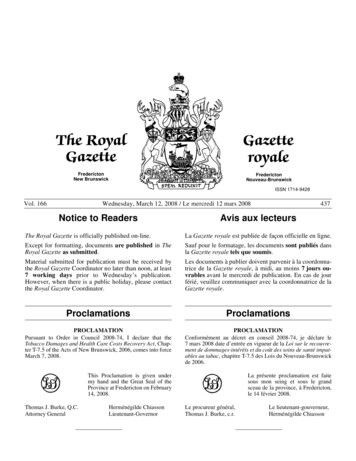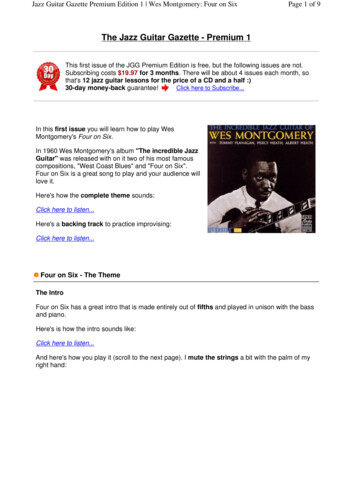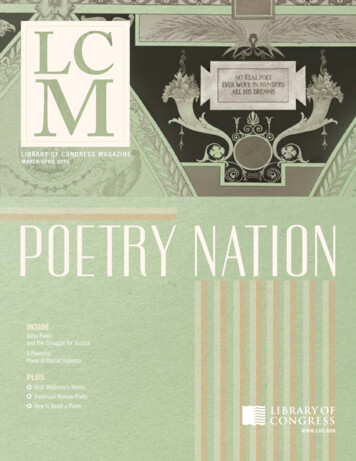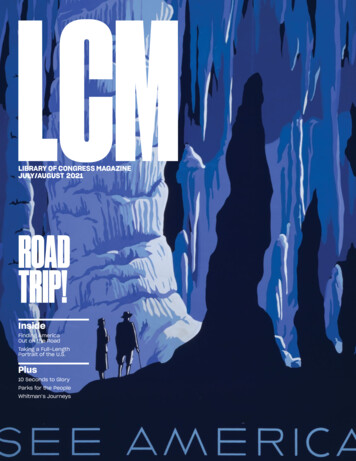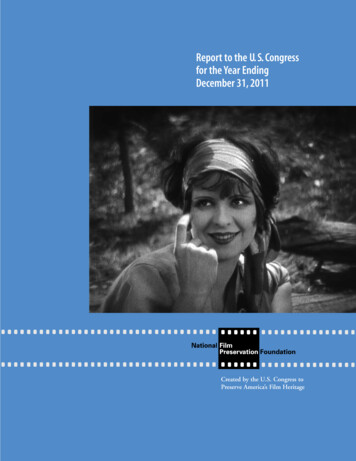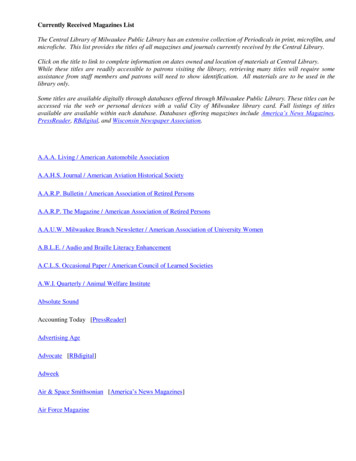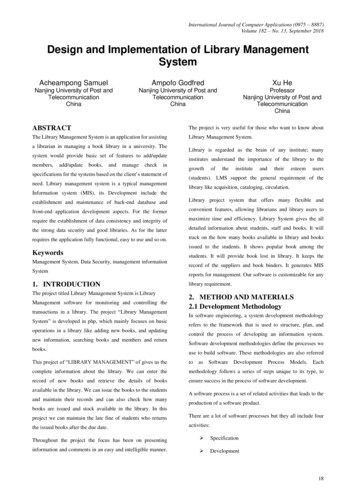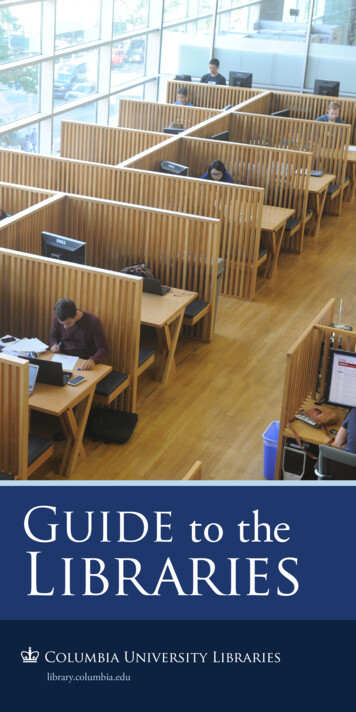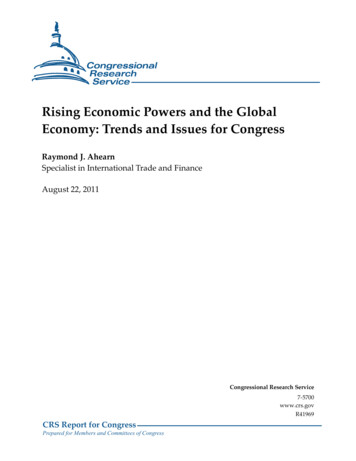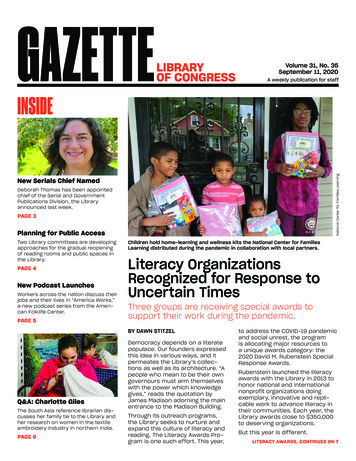
Transcription
GAZETTELIBRARYOF CONGRESSVolume 31, No. 35September 11, 2020A weekly publication for staffNational Center for Families LearningINSIDENew Serials Chief NamedDeborah Thomas has been appointedchief of the Serial and GovernmentPublications Division, the Libraryannounced last week.PAGE 3Planning for Public AccessTwo Library committees are developingapproaches for the gradual reopeningof reading rooms and public spaces inthe Library.PAGE 4New Podcast LaunchesWorkers across the nation discuss theirjobs and their lives in “America Works,”a new podcast series from the American Folklife Center.PAGE 5Children hold home-learning and wellness kits the National Center for FamiliesLearning distributed during the pandemic in collaboration with local partners.Literacy OrganizationsRecognized for Response toUncertain TimesThree groups are receiving special awards tosupport their work during the pandemic.BY DAWN STITZELQ&A: Charlotte GilesThe South Asia reference librarian discusses her family tie to the Library andher research on women in the textileembroidery industry in northern India.PAGE 6Democracy depends on a literatepopulace. Our founders expressedthis idea in various ways, and itpermeates the Library’s collections as well as its architecture. “Apeople who mean to be their owngovernours must arm themselveswith the power which knowledgegives,” reads the quotation byJames Madison adorning the mainentrance to the Madison Building.Through its outreach programs,the Library seeks to nurture andexpand this culture of literacy andreading. The Literacy Awards Program is one such effort. This year,to address the COVID-19 pandemicand social unrest, the programis allocating major resources toa unique awards category: the2020 David M. Rubenstein SpecialResponse Awards.Rubenstein launched the literacyawards with the Library in 2013 tohonor national and internationalnonprofit organizations doingexemplary, innovative and replicable work to advance literacy intheir communities. Each year, theLibrary awards close to 350,000to deserving organizations.But this year is different.LITERACY AWARDS, CONTINUED ON 7
NOTICESDONATED TIMEThe following employees have satisfied eligibility requirements to receive leavedonations from other staff members. Contact Lisa Davis at (202) 707-0033.Shayerah AkhtarCraig AndrewsSharif AdenanLynette BrownEric ClarkLaurie HarrisSharron JonesTerri Harris-WandixDonna WilliamsCOVID-19 UPDATEThe Library’s Health Services Division (HSD) continues to monitor Library staffmembers with symptoms, clinical diagnoses or positive test results for COVID19. On Sept. 4, HSD announced that three employees reported symptomsassociated with COVID-19 last week. Some employees reporting symptomsare not diagnosed to have COVID-19, but, out of caution, the Library is monitoring all reports of symptoms.HSD is communicating with all staff members who become ill. In cases inwhich ill individuals were present in Library buildings, HSD is also notifying theirclose work contacts and cleaning and disinfecting the areas affected. Thesame process is followed when contractors in Library buildings become ill.More information on the Library’s pandemic response: https://go.usa.gov/xdtV5 (intranet) or https://go.usa.gov/xdtVQ (public-facing staff web page)MASKS NOT OPTIONAL IN LIBRARY BUILDINGSAs more staff are returning to work on-site in Library buildings, the HealthServices Division wants to emphasize the importance of the Library’s policyon wearing masks: https://go.usa.gov/xGWss. They are not optional when staffare in any Library building.Staff must wear a barrier mask or cloth face covering (https://go.usa.gov/xGWHq) over both their noses and their mouths when they arrive at a Librarybuilding; when they are in common areas, such as bathrooms, hallways andelevators; and any other time they are not able to maintain at least six feet ofdistance from others, including outside Library buildings.Questions? Contact the Health Services Division at hso@loc.gov or (202) 7078035.REMINDER ABOUT POLITICAL ACTIVITIESWith election season underway, the Office of the General Counsel (OGC)encourages staff to review LCR 9-1780 (Political Activity), LCR 9-1730 (OutsideEmployment and Activities), and OGC’s Political Activities FAQ (https://go.usa.gov/xfScT). Here’s one Q&A:May I display a political picture, sticker, badge or button while on Library premises or in my own premises while on telework?Yes, but only if such items are not visible to the public, employees whom yousupervise or congressional clients. Be mindful of your attire and backgroundduring Skype and WebEx meetings.Questions? Contact ethics@loc.gov.2SEPTEMBER 11, 2020GAZETTELIBRARYOF CONGRESSloc.gov/staff/gazetteAPRIL SLAYTONExecutive EditorMARK HARTSELLPublications EditorWENDI A. MALONEYWriter-EditorCONTRIBUTING EDITORSDeanna McCray-James, calendarKia Campbell, Moving OnLisa Davis, donated leavePROOFREADERGeorge ThuronyiDESIGN AND PRODUCTIONAshley JonesMISSION OF THE LIBRARY OF CONGRESSThe Library’s central mission is to engage,inspire and inform Congress and the Americanpeople with a universal and enduring source ofknowledge and creativity.ABOUT THE GAZETTEAn official publication of the Library of Congress,The Gazette encourages Library managers andstaff to submit articles and photographs ofgeneral interest. Submissions will be edited toconvey the most necessary information.Back issues of The Gazette in print are availablein the Communications Office, LM 143. Electronicarchived issues and a color PDF file of the currentissue are available online at loc.gov/staff/gazette.GAZETTE WELCOMES LETTERS FROM STAFFStaff members are invited to use the Gazette forlively and thoughtful debate relevant to Libraryissues. Letters must be signed by the author,whose place of work and telephone extensionshould be included so we can verify authorship.If a letter calls for management response, anexplanation of a policy or actions or clarificationof fact, we will ask for management response.—Ed.Library of Congress GazetteWashington, DC 20540-1620Editorial: Mark Hartsell, 7-9194, mhartsell@loc.gov,or Wendi Maloney, 7-0979, wmal@loc.govDesign and production: Ashley Jones, 7-9193,gaze@loc.govISSN 1049-8184Printed by the Printing Management SectionGAZETTE DEADLINESThe deadline for editorial copy for the Sept. 25Gazette is Wednesday, Sept. 16.Email editorial copy and letters to the editor tomhartsell@loc.gov and wmal@loc.gov.To promote events through the Library’s onlinecalendar (www.loc.gov/loc/events) and theGazette Calendar, email event and contactinformation to calendar@loc.gov by 9 a.m.Monday of the week of publication.Boxed announcements should be submittedelectronically (text files) by 9 a.m. Monday theweek of publication to mhartsell@loc.gov andwmal@loc.gov.
NEWSSerial and Government Publications Division Gets New ChiefOver more than 20 years at theLibrary, Thomas has held numerous positions as an expert in thedigital serials process. Through herspecialized knowledge of newspapers, metadata, born-digitalmaterials, collections accessibilityand e-acquisitions, she has playeda significant role in furthering theLibrary’s efforts to develop a comprehensive management systemto support the transition from atraditional print to a digital mediaenvironment.Before being named acting chief,Thomas served as the Library’slead liaison for the National Endowment for the Humanities (NEH)National Digital Newspaper Program, a partnership betweenthe Library and the NEH to builda national digital resource foraccessing newspaper bibliographical information and historicalnewspapers. Thomas oversaw thegrowth of the program to include50 states and territories, visitingmore than 30 states to conductsite visits with program participants. In addition, she led thedivision’s digital conversion team,which is responsible for digitizingan average of 1.25 million pages ofhistorical newspapers each year.enhancing and extending the useof unparalleled print collectionsand to address the challenges ofan increasing digital-only publishing world, meeting the needs andexpectations of today’s researchers,” said Thomas.Abbie GrotkeDeborah Thomas has beenappointed chief of the Serial andGovernment Publications Division,the Library announced last week.She has served as acting chief ofthe division since December.Deborah ThomasThomas also contributed substantively to the Chronicling Americaproject, through which digitizedpages are made available. Sheprovided expertise on the technicaland programmatic management ofthe project and ensured that thedatabase, which contains morethan 16 million newspaper pages, isaccessible online.“Deb’s success in helping establishthe nationally renowned NationalDigital Newspaper Program andChronicling America — one of theLibrary’s signature digital programs— is experience that will help shapethe division’s approach to digitalstrategy, collections and accessfor years to come,” Eugene Flanagan, director of General and International Collections, said.She joined the Library in 1998 as adigital conversion specialist. In thatcapacity, she led the coordinationand implementation of “Meeting ofFrontiers,” an international bilingualweb archive of digital assets fromRussian and Alaskan libraries andthe Library of Congress.Thomas has published numerousarticles based on her professional experience with the Library,including “Voices and Viewpoints inChronicling America: Uses of Historical News for Education and Outreach” and “Helping Students ReadBetween the Lines: Identifying Biasand Attitude in the Press ThroughAnalysis of Newspaper FeaturesRelated to the Election of 1912.”Prior to her tenure with the Library,Thomas worked in web and database development. She beganher career with the SmithsonianInstitution’s National Museum ofAmerican Art.Thomas holds a bachelor’s degreefrom the College of William andMary and a certificate in publishingfrom Radcliffe College. “I am excited for the opportunity to lead the division in bothLISTENING-SESSIONRECORDINGS AVAILABLEThe Human Capital Directorate (HCD)conducted two virtual listening toursin August for Library staff to sharetheir day-to-day challenges whileworking remotely and creative solutions they have identified to maintainwork-life balance during the pandemic. Such conversations are helping Library leaders to understandthe experiences of staff during thistime. Recordings of the sessions areavailable (https://go.usa.gov/xGWsE)to staff who have Library networkaccess.THE LIBRARY OF CONGRESS GAZETTE3
Planning Underway for Public Access to Library BuildingsNo date has been set yet for thebeginning of phase three of theLibrary’s plan to restore on-siteoperations. But an approach toresuming activities in this phase —including opening reading roomsand public spaces in the Library —is being developed. Driving all decisions are the health and safety ofstaff and Library patrons.Earlier this year, the Library chartered two groups to support thisplanning. The Reading RoomsCommittee was established tocoordinate actions for a measured,incremental return to full reading-room operations. The committee’s areas of focus include staff,researcher and patron access, useof space and equipment, standards for physical distance, ventilation, plexiglass shields, securityand cleaning, including the availability of disposable keyboard andmouse covers.The Public Access and SpecialEvents Committee was established to develop plans to restoreOIG WOULD LIKE TO KNOWReport suspected illegal activities,waste, fraud, abuse and mismanagement in Library of Congressadministration and operations tothe Office of the Inspector General (OIG). A link to all Library regulations is available on the staffintranet at public access and special eventsin a similarly incremental andmeasured way. The committeefocused on developing a plan forthe gradual return of visitors toLibrary buildings in the three partsof phase three. It aims to ensurea safe and well-organized visitorexperience, including timed andticketed public access, pathwaysfor visitors to follow to maintainsocial distancing and clear communications about what visitorscan expect when they visit.Both committees were guidedby prevailing health precautionsrelated to COVID-19 and federalguidelines.Starting in part one of phase three,the Library will provide full service in select reading rooms toas many researchers and registered readers as possible, subjectto assembly limits and operatinghours. During this time, Librarybuildings will be open for researchpurposes only and will not be opento the public. Phase three, partone, operations will likely includerestricted entrance protocols andother health safeguards based onlocal conditions.The Library’s plan for part two ofphase three includes full restoration of all reading rooms andlimited, ticketed public access.Tickets will continue to be requiredin phase three, part three, but thenumber of tickets available eachday will increase.Both committees include stafffrom Library Services, the LawLibrary, the Copyright Office, theCongressional Research Service,Integrated Support Services, Security and Emergency Preparednessand the Human Capital Directorate.Roberto Salazar, acting chief operating officer for the Library Collections and Services Group, is chairof the Reading Rooms Committee.Shari Werb, director of the Centerfor Learning, Literacy and Engagement, is chair of the Public Accessand Special Events Committee. CITIZEN DJS MAKE HIP-HOPTo make a report, contact OIG via theonline form at contact-us/ or report anonymouslyby mail to 101 Independence Ave.,S.E., LM 630, Washington, D.C.,20540-1060.Jaime Mears of the Office of the Chief Information Officer (row two, second fromright), John Fenn of the American Folklife Center (row two, far right) and Libraryinnovator-in-residence Brian Foo (row three, third from right) teamed up with Miamibased nonprofit PATH (Preserving, Archiving and Teaching Hip-Hop) on Aug. 26 fora virtual music-making workshop that delved into Foo’s LC Labs’ project, Citizen DJ(https://go.usa.gov/xGjRD).4SEPTEMBER 11, 2020
Candacy Taylor for the Occupational Folklife Project of the American Folklife CenterAmericanFolklife CenterLaunches NewPodcastWorkers across thenation discuss theirjobs and their lives inthe series.BY LEAH KNOBELThe American Folklife Center (AFC)is bringing the voices of workersthroughout the country to listeners with “America Works,” a newpodcast series that celebrates thediversity and tenacity of the American workforce during a time ofeconomic crisis and transition. Thefirst three episodes were releasedon Sept. 3 to coincide with LaborDay.Each 10-minute episode is basedon a single oral history interviewfrom the AFC’s ongoing Occupational Folklife Project, a multiyearinitiative started a decade ago todocument the culture of contemporary workers. The full interviews,which average 50 to 60 minutes,feature workers discussing formative experiences, on-the-job challenges and rewards, aspirationsand occupational communities.Given the economic challengesfacing everyday Americans duringthe COVID-19 pandemic, thefirst-person narratives sharedin “America Works” are a timelyreminder of the spirit of the U.S.workforce.“It is inspirational to hear thesestories and to realize how manycommitted and optimistic fellowcitizens are out there working toimprove their communities, support their families and build abetter future for us all,” said seniorfolklife specialist Nancy Groce, thepodcast’s host.Like the Library’s “American Lives”collection of interviews with workers recorded during the GreatCalifornia hairdresser Jeff Hafler shares his love for his profession in an episode ofthe new podcast series, “America Works.”Depression, the new series highlights the experiences of working Americans whose voices arecurrently underrepresented in theLibrary’s holdings.Since the start of the OccupationalFolklife Project, AFC fieldworkers have compiled almost 1,000interviews from across the country, documenting more than 100professions. More than 400 of theinterviews have been made available online, and researchers canaccess the entire collection in theAFC reading room when the Libraryis open to the public.The first season of “AmericaWorks” reflects the occupationaland regional diversity that characterizes the collection. Listenerscan dive into the stories of individuals who provide some of themost essential services to oursociety, including Joyce Vegarof Coos County, Oregon, a homehealthcare worker who explainsthe patience and compassionrequired to provide a certain levelof care for another. Chicago ironworker Sharon Sisson shares anunforgettable tale of how she wonthe respect of a chauvinistic maleco-worker who was harassing heron a job site. Jeff Hafler of WonderValley, California, describes whathe loves about his work as a hairstylist and beauty shop owner,why customers confide in theirstylists and the pride he takes inworking in the service industry.“Having a vocation,” Hafler said,“is often a better guaranteeof employment than a collegedegree.”Episodes of “America Works” arebeing released weekly on ApplePodcasts, Stitcher and loc.gov/podcasts — a fourth episode in theseries came out yesterday. Theyare also being featured on theLibrary’s social media channels.Listen here: https://go.usa.gov/xGbAu Your Employee Personal Page (EPP) is atwww.nfc.usda.gov/epps/THE LIBRARY OF CONGRESS GAZETTE5
QUESTION & ANSWERing the survival of their families. Iexplore issues such as how genderaffects the women’s mobilitybeyond their homes, how physicaland emotional labor (arising fromfamily care) are sources of pain forthe women and how both typesof labor are important factorsto consider in researching andunderstanding the women’s workas embroiderers — their emotionallabor bleeds into their work andaffects their bodies in complicatedways. I conducted my fieldworkand other research in Lucknow inUrdu.Shahrukh KhanWhat brought you to the Library,and what do you do?Charlotte GilesCharlotte Giles is a South Asiareference librarian in the AsianDivision.Tell us a little about yourbackground.I grew up in Houston, where Iattended the High School for thePerforming and Visual Arts andthe Houston Ballet Academy — in aprevious life, I was training to be aballet dancer. After high school, Imoved to Massachusetts and wentto school at Hampshire College. Iam now a Ph.D. candidate in Asianstudies at the University of Texasat Austin.My other home base is Lucknow,India, where I studied Urdu withthe American Institute of IndianStudies with wonderful teachersand ate a lot of great food. BeforeI came to the Library, I was inLucknow on a Fulbright scholarship completing my dissertationfieldwork on women in the textileembroidery industry in northernIndia.My dissertation focuses on thework of embroidery as an important part of the women’s lives, onethat causes an early breakdownof their bodies while also ensur6SEPTEMBER 11, 2020My mother was a dance referencelibrarian with the Performing ArtsLibrary, a former satellite facilityof the Library that was located inthe Kennedy Center. Her lifelongwork as a librarian at the KennedyCenter/Library of Congress, theHouston Public Library and, now,the Johnson Space Center introduced me to librarianship as analternative academic career path.As a South Asia reference librarian,I work with my colleague Jonathan Loar to care for and curatethe South Asia Collection and toprovide reference services toresearchers. We also work veryclosely with the Library’s overseasfield offices in Delhi and Islamabad.How has the pandemic affectedyour work?The pandemic has affected mywork in a number of ways. Ourdivision has continued to receiveregular requests for researchhelp through email and the Ask aLibrarian service. Fulfilling requestswithout access to our collectionsduring maximum telework was difficult. On the upside, we now haveincreased access through a smallbut awesome group of Asian Division technicians and librarians whohave returned to work on-site.My focus has been on producing reference materials such as aStoryMap and LibGuide to highlightour electronic and print collections.Still, I miss being around all thebeautiful things at the Library andthe experts who can tell me moreabout their work.What are some of your standoutprojects so far?Working with Jonathan, I have concentrated on bringing our areas ofexpertise to researchers beyondthe D.C. area through efforts suchas a webinar introducing the SouthAsia collections.I have also appreciated workingwith specialists in other divisionswho, like me, are interested in theuse of textiles in library collections.The Asian Division was primed tohost a display and panel event atthe beginning of May with severalother divisions focusing on textile-based items related to Asiaacross the Library. Unfortunately,because of the pandemic, we hadto cancel. But we have moved thepanel online. On Oct. 15 at 2 p.m.,speakers from the Main ReadingRoom, the Preservation Directorateand the Textile Museum at GeorgeWashington University willparticipate.Before COVID-19, I also startedtwo new web archiving collections, and I have contributed to athird started at the Islamabad fieldoffice.What do you enjoy doing outsidework?These days, most of my timeoutside work is spent writing mydissertation, which is enjoyable ina sense. I am also an avid cook,baker and embroiderer (a hangover from my fieldwork).What is something your coworkers may not know about you?I have a pet turtle, Shelly, wholoves kale and strawberries. BUILDING ACCESSThe C Street West doors are closedat the request of the U.S. Capitol Police to support its workforceduring the pandemic. Staff shouldenter and exit Library buildingsthrough the Independence Avenuedoors or the Madison Buildinggarage.
NEWSLITERACY AWARDS, CONTINUED FROM 1With the sudden closures ofschools and businesses becauseof the pandemic, literacy organizations have had to adjust quickly.Recognizing the importance oftheir efforts, the Library, in consultation with Rubenstein, repurposed 150,000 in awards moneythis year to support three organizations whose work is having adirect, positive impact on communities affected by recent events.“We worked with David Rubenstein,who wanted to find a way to recognize literacy organizations duringthese challenging times,” KaffieMilikin, the Library’s developmentdirector, said.Twenty-one previous recipientsof major Literacy Awards from theLibrary were invited to competethis year for three special awardsof 50,000 each. A committeemade up of award advisory boardmembers reviewed the applications and made recommendations to Librarian of CongressCarla Hayden. She announced herthree selections on Sept. 10. Theyare the National Center for Families Learning, Pratham Books andRoom to Read.“We are so pleased to recognizethe outstanding efforts of theseorganizations,” Hayden said. “Allthree winners of the 2020 DavidM. Rubenstein Special ResponseAwards have found multiple waysto continue their missions whileadapting to the evolving circumstances and needs of the communities they serve.”Founded in 1989, the NationalCenter for Families Learning (NCFL)provides programming, professional development and resourcesto help eliminate poverty throughmultigenerational learning. NCFLserves 150 communities in 39states and Washington, D.C. Itreceived the American Prize fromthe Literacy Awards program in2017.During the pandemic, NCFL hasfocused on the digital divide — thegulf between those who haveaccess to computers and theinternet and those who don’t — bypartnering with school districtsand other community-based organizations to provide technologyand Wi-Fi access, including mobilebus hotspots. The organizationhas also addressed issues such asfood insecurity and social isolation.In Kentucky, Texas and Colorado,NCFL packaged and delivered foodbundles with backpacks full ofengaging educational books andmaterials to families. In Louisville,Kentucky, NCFL’s hometown, itpartnered with a local nonprofit toproduce public service announcements about COVID-19 that featurefamilies as trusted communitymessengers. It also condemnedthe fatal shootings in the city thisyear of Breonna Taylor and DavidMcAtee, and it is taking steps touse its platforms for social justice.Established in 2004, PrathamBooks is a children’s book publisher based in Bangaluru, India,that has helped millions of childrengain access to engaging, affordable books in multiple languages.Pratham Books received the 2017International Prize.To further its mission, PrathamBooks launched StoryWeaver, anonline, digital repository of multilingual children’s stories that areopenly licensed, giving users freeaccess to them. The platform alsoenables the creation, translation,downloading and printing of stories through embedded tools. Therepository has over 23,000 storiesin 259 languages and continues togrow.As demand surged during thepandemic for digital learningresources, Pratham Books created programs that can be usedin low-resource environments,including a Learn at Home program, thematic reading lists,audiovisual books and a phonebased dial-a-story program thatallows a child to locate a story in achosen language by dialing a tollfree number.In addition, StoryWeaver translated 3,000 books in 28 new languages, including books about thecoronavirus, health and hygieneand social and emotional issues.UNESCO and the World Bank havelisted StoryWeaver as a resourcefor the homebound child duringthe pandemic.Room to Read seeks to transformthe lives of children in low-incomecommunities by focusing on literacy and gender equality in education. Its Literacy in Primary Schoolinitiative helps children becomeindependent readers throughcommunity engagement, provision of quality books and teachingtools and advocacy beyond theclassroom. The Girls’ Education inSecondary School Initiative supports girls in building skills to succeed academically and make keylife decisions through mentorshipand other means. To date, Roomto Read has worked in 16 countriesand benefited 20 million children.Room to Read received the DavidM. Rubenstein Prize in 2014.During the pandemic, Room toRead’s digital platform — LiteracyCloud (https://literacycloud.org) —originally developed for educatorsand book creators in Indonesia,was expanded exponentially. Itnow includes over 1,000 originalRoom to Read children’s booktitles in 19 languages. The titles areavailable as a free resource forstudents, parents and teachers inthe U.S. and around the world.Simultaneously, the organization is working to harness thepower of education to end systemic inequality and to build amore inclusive view of the humanexperience. Room to Read’s 1,600culturally diverse book titles teachchildren about how to relate toothers with empathy, toleranceand justice.“As COVID-19 and recent socialunrest continue to divide us, NCFL,Pratham Books and Room to Readhave found multiple ways to connect to their audiences and adaptto the evolving circumstances andneeds of the communities theyserve,” Milikin said.A Literacy Awards Program Interactive map and additional information on the awards and previous winners is available at read.gov/literacyawards. THE LIBRARY OF CONGRESS GAZETTE7
If a letter calls for management response, an explanation of a policy or actions or clarification of fact, we will ask for management response.— Ed. Library of Congress Gazette Washington, DC 20540-1620 Editorial: Mark Hartsell, 7-9194, mhartsell@loc.gov, or Wendi Maloney, 7-0979, wmal@loc.gov Design and production: Ashley Jones, 7-9193, gaze .

